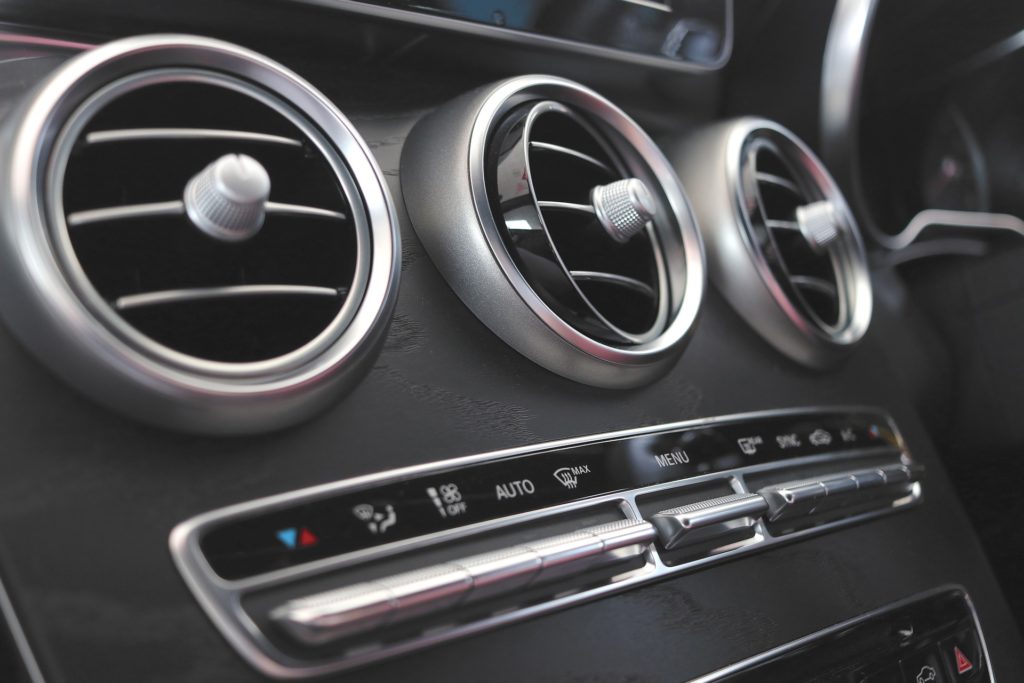
Warm Air Blowing from the AC? Skip the Canned Refrigerant and Get Real Auto AC Repair
Few things are better than cold air blasting out of your car’s air conditioner on a hot San Diego day. But if the air blowing out of your AC unit is barely cool or lukewarm, your car’s AC needs a tune up. Though auto air conditioning repair seems like a simple job, your AC unit is quite complicated. Many parts need to work together in correct sequence in order to produce and blast that nice cold air. So if your car’s AC is barely keeping you cool, it may be time to bring it in for an inspection.
How to Troubleshoot Your Car’s Air Conditioning Unit
If you don’t get a blast of ice-cold air when you turn the AC to its lowest possible temperature and turn up the fan all the way, you need automotive AC repair soon.
The most obvious problem could be low refrigerant fluid, which is the material that produces the coldness of the air blowing from the AC unit. If refrigerant levels are too low (likely due to a leak), it will signal to the AC unit that there is a problem and it will not operate.
Refrigerant Leak Could be the Culprit of an AC that Blows Warm Air
Because vehicle AC units are a closed rather than an open operating system, refrigerant levels should in theory never be low. Closed systems were designed by the manufacturer so that their parts and fluids last over the lifetime of the vehicle. As such, fluids don’t need to be changed and remain in a constant state of freshness.
By contrast, the cooling system is an open system, which requires a cooling system flush per certain mileage or age intervals. This is why low refrigerant levels tend to signal a leak in the AC unit whereas low coolant levels may just signal that the cooling system needs to be topped off. Getting regular AC check ups are a good idea because they detect leaks or AC problems in the early stages before the AC starts blowing warm air.
How to Determine if Your Vehicle’s AC System is Leaking?
If you are so inclined, A/C Leak Detector Kits are available at many auto parts stores and could help you determine if and from where your AC is leaking refrigerant fluid. Unfortunately, these kits retail at $85-$100 each and aren’t easy to use. Moreover, even if they do show you where you have a leak, they don’t show you how to fix it.
Most automotive experts agree that only a professional mechanic should attempt to perform AC automotive repair and diagnosis. Tampering with the car’s AC unit is likely to cause more problems as the system is delicate and requires the expertise of a trained mechanic. Moreover, refrigerant fluid or “Freon” is a dangerous, potentially toxic chemical that needs to be handled with care. (Chemically speaking, today’s cars no longer use Freon due to its harm to the environment but many people still call AC refrigerant Freon.)
What about Car AC Refrigerant in a Can?
Though auto parts stores sell refrigerant in a can for air conditioning units, most certified auto mechanics in San Diego advise against using them. These cans suggest that you can solve your car’s AC problems by blasting more refrigerant into them. Topping of your AC unit isn’t a good idea because again, it is a closed system and was not designed for this. While use of these cans may temporarily solve this problem, they do not fix the leak (though some cans claim they do). Either way, your AC unit will need proper auto AC repair so there’s no sense messing around with them.
Problems with Automotive AC Refrigerant Cans Abound
If you do opt to use these refrigerant cans, make sure you wear gloves and carefully follow the directions. Not doing so could result in burns to your hands and damage to your AC system. Be aware that the so-called auto air conditioning R-134A substance in these cans is not chemically the same substance as the air conditioning refrigerant that comes with standard vehicles. European cars, particularly older model BMWs, Audis, and Mercedes Benz, have had AC performance issues when using these canned refrigerants in part for this reason.
Low Refrigerant Levels for the AC May Not be the Problem
Though low refrigerant levels are the first thing that comes to mind when warm air instead of cold blows from the AC, it certainly isn’t the only possible cause of the problem.
Another cause could be with the AC system’s condenser, which won’t work properly if obstructions such as leaves, sticks or other debris are stuck to it. When the vehicle is turned off, and only then, brush off debris from the condenser to improve its functionality. You can even spray it down with a garden variety hose to rinse of accumulated gunk. A dirty cabin filter will also negatively impact the performance of the car’s AC unit so check that as well.
A third possible problem could be with the compressor clutch system. When the motor running, check under the hood to see if the clutch is engaging the compressor system as it should. (You will know if it isn’t; it will just be turning without pulling anything.) The belt that connects the compressor wheels should be taut rather than loose or that could be the cause of the problematic air conditioner.
Chose an Auto AC Tune-up Instead of Refrigerant-in-a-Can Solutions
Maintaining your vehicle’s AC system year-round will help it run stronger, longer. Unfortunately, most people only think of their AC unit when it’s hot outside. Running your AC every other week or so for a few minutes even during the cool months will help prevent the hoses, gaskets and other components from drying out and cracking from lack of use.






